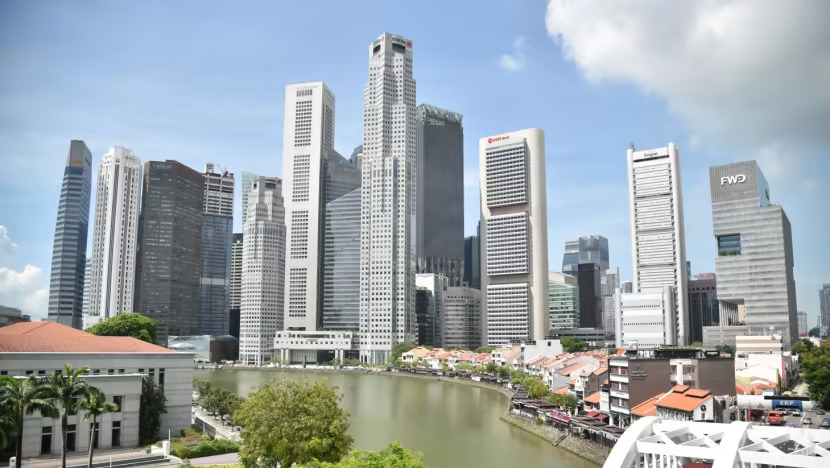Singapore's core inflation falls to 2.1% in October, lowest level since December 2021

(Photo credit: CNA/Syamil Sapari)
Source: Channel News Asia
Singapore's core inflation fell to 2.1 per cent year-on-year in October, its lowest level in nearly three years.
The decrease from 2.8 per cent in September was largely due to a moderation in services, electricity and gas, and retail and other goods inflation, said the Monetary Authority of Singapore (MAS) and Ministry of Trade and Industry (MTI) on Monday (Nov 25).
The last time core inflation was at 2.1 per cent was in December 2021. In general, it has been trending downwards since it hit 5.5 per cent in January 2023.
On a month-on-month basis, core inflation fell by 0.3 per cent in October.
A Reuters poll of economists had forecast core inflation to come in at 2.5 per cent in October.
Core inflation excludes accommodation and private transport.
Overall or headline inflation eased to 1.4 per cent year-on-year in October from 2 per cent in September.
The fall was driven by slower accommodation inflation and a steeper decline in private transport costs, in addition to lower core inflation, MAS and MTI said.
SECTORS
Services inflation dropped to 2.3 per cent year-on-year in October from 3.3 per cent in September mainly due to smaller increases in the costs of holiday expenses and healthcare services.
Electricity and gas inflation moderated to 2.5 per cent in October from 6.3 per cent the previous month as the prices of both electricity and gas rose at a slower pace.
Retail and other goods inflation decreased to 0.1 per cent from 0.8 per cent mainly due to a steeper decline in clothing and footwear prices, as well as a fall in the prices of medicines and health products.
Food inflation remained unchanged at 2.6 per cent as the prices of non-cooked food and food services rose at a similar pace in September and October.
For accommodation, inflation edged down to 2.5 per cent from 2.7 per cent on account of a smaller increase in rents.
Private transport costs fell at a slightly faster pace, from -2.4 per cent to -2.5 per cent, due to a larger decline in car prices.
OUTLOOK
"Although global energy prices have been volatile in recent weeks, they have on average remained below the levels a year ago," said MAS and MTI.
"Meanwhile, in tandem with easing global inflation and the gradually strengthening trade-weighted S$ exchange rate, Singapore’s imported manufactured goods prices have also continued to be on a broad decline."
Domestically, unit labour costs are projected to rise more gradually, alongside moderating nominal wage growth and improving productivity.
Services inflation, which has been on an easing trend, should slow further over the rest of 2024, said the authorities.
Core inflation is expected to remain at around 2 per cent through to end-2024, said MAS and MTI.
It is projected to average 2.5 to 3 per cent in 2024 as a whole, and step down further to 1.5 to 2.5 per cent in 2025.
Accommodation inflation is forecast to come in lower next year, which should partly offset an anticipated pick up in private transport inflation amid "firm demand" for cars.
Overall inflation is expected to come in at around 2.5 per cent for the whole of 2024, and average from 1.5 per cent to 2.5 per cent next year.
"Risks to the inflation outlook are relatively balanced. Domestically, stronger-than-expected labour market conditions could lead to a slower easing in unit labour cost growth," said MAS and MTI.
"An intensification of geopolitical tensions may lead to higher commodity prices and add to imported costs. Conversely, a significant downturn in the global economy could induce a greater easing of cost and price pressures, causing domestic inflation to come in lower than expected."
OCBC chief economist Selena Ling noted that US President-elect Donald Trump has policy priorities that focus on immigration, tariffs and tax cuts, and these may be inflationary.
"In particular, the touted 60 per cent trade tariffs on China and a universal 10 to 20 per cent tariffs on (the) rest of the world, may usher in some retaliation if they materialise, and be inflationary in nature," she added.
If the US Federal Reserve has less flexibility to cut interest rates due to a "second inflation bout", there could be a spillover effect on other economies, limiting room for other central banks to ease monetary policies.
"The fear factor pertaining to Trump 2.0 policies may imply that it is more prudent to wait and see rather than rush prematurely to a policy easing," she said.
The upcoming Singapore Budget next year could see a "bigger fiscal impulse" to address cost of living issues and job security, given that it may be the last Budget in this term of government, said Ms Ling.
There is "no urgent need" to ease the monetary policy stance in the near term when "dark inflationary clouds" may be gathering, she added.
